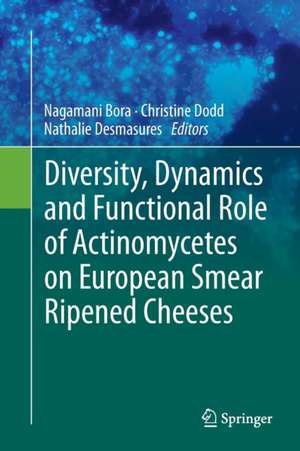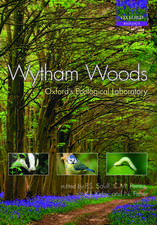Diversity, Dynamics and Functional Role of Actinomycetes on European Smear Ripened Cheeses
Editat de Nagamani Bora, Christine Dodd, Nathalie Desmasuresen Limba Engleză Paperback – 10 sep 2016
| Toate formatele și edițiile | Preț | Express |
|---|---|---|
| Paperback (1) | 556.65 lei 38-44 zile | |
| Springer International Publishing – 10 sep 2016 | 556.65 lei 38-44 zile | |
| Hardback (1) | 567.32 lei 38-44 zile | |
| Springer International Publishing – 14 noi 2014 | 567.32 lei 38-44 zile |
Preț: 556.65 lei
Preț vechi: 695.81 lei
-20% Nou
Puncte Express: 835
Preț estimativ în valută:
106.55€ • 115.77$ • 89.56£
106.55€ • 115.77$ • 89.56£
Carte tipărită la comandă
Livrare economică 16-22 aprilie
Preluare comenzi: 021 569.72.76
Specificații
ISBN-13: 9783319364780
ISBN-10: 3319364782
Pagini: 245
Ilustrații: XII, 233 p. 33 illus., 22 illus. in color.
Dimensiuni: 155 x 235 x 13 mm
Greutate: 0.35 kg
Ediția:Softcover reprint of the original 1st ed. 2015
Editura: Springer International Publishing
Colecția Springer
Locul publicării:Cham, Switzerland
ISBN-10: 3319364782
Pagini: 245
Ilustrații: XII, 233 p. 33 illus., 22 illus. in color.
Dimensiuni: 155 x 235 x 13 mm
Greutate: 0.35 kg
Ediția:Softcover reprint of the original 1st ed. 2015
Editura: Springer International Publishing
Colecția Springer
Locul publicării:Cham, Switzerland
Cuprins
Smear ripened cheeses.- Genomics and functional role of actinomycetes on smear ripened cheeses.- Characterization of Actinomycetes from smear ripened cheeses - A polyphasic approach.- Actinobacterial diversity and dynamics as revealed by denaturing gradient gel electrophoresis.- Analyzing Metagenome of Smear Cheese Flora using Next Generation Sequencing Tools.- Microbial Interactions in Smear-Ripened Cheeses.- Structure–Function Relationships of Microbial Communities.- Systems Biology of Smear Cheese Consortia.- Safety and Quality Aspects of Smear Ripened Cheeses.- Solid state fermentation.
Textul de pe ultima copertă
Cheese is a significant part of European culture and its production, both industrial and artisanal, is a significant economic activity. Smear cheeses are one element of that diverse cultural and economic activity. And they are an ecological niche which illustrates the diversity of, especially, though not exclusively, actinomycetes. Mainstream ecology looks at the oceans, soil, rhizosphere, human microbiomes and plant, insect and marine animal symbionts which influence the climate, agriculture, human health and the ecology of higher organisms. But food microbiology can influence human well-being and nutrition and, as an ecological niche, illustrates the same broad principles in action as other ecological studies, but, in many ways offers a more controlled and controllable environment to study. The bacterial diversity present on smear cheese surfaces is like a model system which will provide the vehicle for developing a research strategy for food-environment microbiology. In this book we take a look at food-based ecological niche by focusing on the actinomycetes. This book presents many of the aspects, from the taxonomy of the cheese flora and its interaction with the ‘house flora’ to the functional manipulation of the organoleptic properties of the dairy product to the pathogenic risk. Modern methods of taxonomic characterization provide significant data in understanding the functional roles of members of the microbial flora including their enzymatic potential, the presence of virulence genes or probiotic factors. Taxonomy guided high throughput metagenome analysis is a generic approach to systems level analysis of microbial ecosystems, such as those found in the food chain. The data generated by metagenomic analysis will require extensive bioinformatic support which will provide the data not only for taxonomic characterization, community analysis and ecosystem dynamics but the data will also provide a foothold into the evolution and ecosystem function ofthe community. The ultimate understanding of the metabolome and the regulation of such a complex ecosystem will provide the framework for further technological advances in solid state fermentation.
Caracteristici
Numerous protocols relevant to do research in microbial technology Real time case studies Current and future technologies contributing to research and development of cheese quality and safety Includes supplementary material: sn.pub/extras











